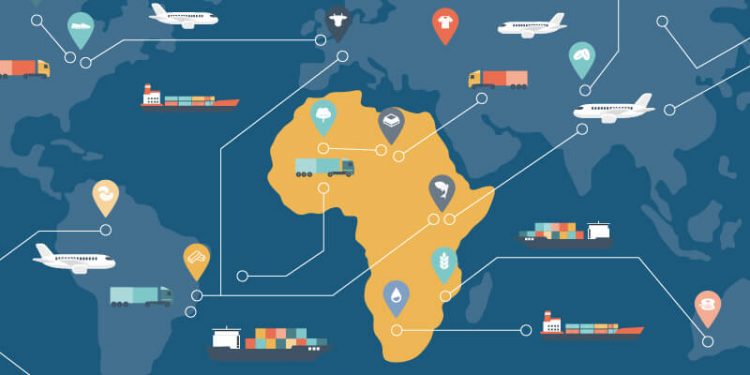Africa is set to record its first recession in a quarter of a century as the COVID-19 pandemic threatens trade and growth gains.
A depressed global economy, forecast to contract by 4.4% in 2020, is linked to this recession in Africa this year. Africa’s temporary economic decline will see trade and industrial activity reduced, generally identified by a fall in GDP in two successive quarters.
“In a context of a synchronized global downturn, Africa is set to experience its first recession in a quarter-century, says The African Trade Report, 2020, published by Afreximbank.
The 2020 trade report mentions that Africa remains the most commodity-dependent region in the world.
Pandemic containment measures implemented to stem the spread of the Covid-19 virus depressed global demand, leading to supply shocks triggered by a sharp drop in commodity prices.
Africa Intra Trade Stats
The report reveals that Africa remains on the sidelines of global trade, accounting for just 2.8% of total official trade flows in 2019, while intra-African trade is severely limited, accounting for only 14.4% of total African trade in 2019.
This contrasts sharply with intra-continental trade elsewhere globally, which reached 73% in Europe and 52% in Asia last year. Intra-African trade was worth just US$147.8 Billion in 2019r, down from US$156 Billion in 2018.
Moreover, South Africa alone was involved in 23.1% of African cross-border trade last year, followed by the Democratic Republic of Congo with 7.7%.
Nigeria takes the third spot, even though other African countries account for only 3% of its imports and 13% of its exports, with the latter dominated by oil exports.
The volume of Nigerian trade with the rest of the continent fell last year, from US$10.9Billion in 2018 to US$10.4 Billion, as the country’s share of intra-African trade remained constant at about 7.03%.
The next most prominent contributors to intra-African trade are the Democratic Republic of Congo, Nigeria, Namibia, Zambia, Egypt, Zimbabwe, Botswana, Cote d’Ivoire, and Congo Brazzaville, in that order.
However, forecasts point to a robust and synchronized global recovery in 2021, with global GDP expanding by over 5% and aggregate output expanding by just as much across Africa.
The forecast recovery reflects both progress regarding understanding and treatment of Covid-19 as well as prevention following a breakthrough in the development of vaccines.
But the strong and synchronized forecast global recovery also reflects the scale of policy responses, which have been swift, bold, and coordinated.
Through counter-cyclical measures, most governments and multilateral development finance institutions have drawn up large monetary and fiscal stimulus plans to support economic recovery post-containment phase.
Under the G20 Debt Service Suspension Initiative (DSSI), the international community has provided relief to most affected emerging developing market economies, freeing up scarce financial resources that can be directed to address the socioeconomic fallout from Covid-19.
For instance, Afreximbank’s US$3bn Pandemic Trade Impact Mitigation Facility is providing much-needed liquidity support to trade payments falling due. It assists member countries whose fiscal revenues are tied to specific export sectors and commodities to manage the sudden revenue declines due to a collapse in global demand and commodity prices.
This report lists six African countries as among the ten fastest-growing economies in the world in 2019. These were South Sudan (11.3%), Rwanda (10.1%), Libya (9.9%), Ethiopia (9%), Djibouti (7.5%), and Côte d’Ivoire (6.9%).
The pandemic has severely shaken the global trade situation but the trends, opportunities and challenges of 2019 will still be apparent this year and beyond.
The African continent as a whole registered growth of 3.6% last year, ahead of total global growth of 2.9%. Growth varied considerably across the continent, with Eastern Africa recording the strongest regional growth at 5.1%, including South Sudan’s recovery from its civil war and continued strong growth of 5.6% in Kenya.
ALSO READ;
Zambia Seeks Six Month Debt Relief for $3Bn Eurobond
Reprieve as Poorest Countries to Save $12 Billion in Debt Relief




